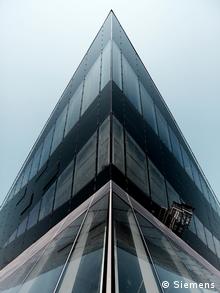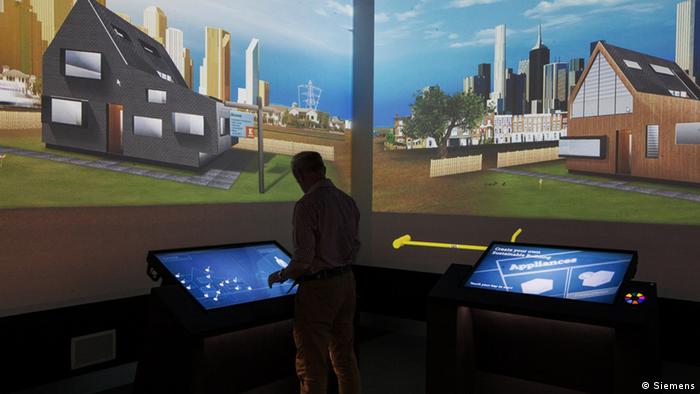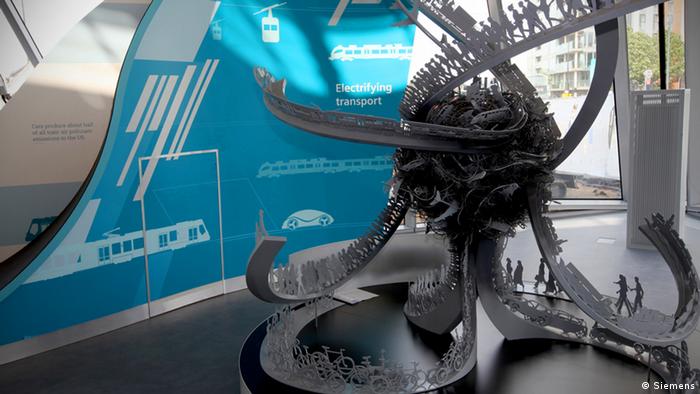
Sustainable Development
London is home to iconic buildings like the cucumber shaped "Gherkin" and "the Shard" skyscraper, resembling a piece of broken glass. Now, Munich-based Siemens added the most modern of buildings to London's skyline.
Electronics giant Siemens officially unveiled the Crystal on Wednesday. It houses the company's Centre of Competence Cities. The futuristic, multi-angled glass structure is situated in Newham, east London, and cost 30 million pounds (37 million euros). It's one of the most energy-efficient and low-carbon buildings in the world.
 The Crystal is a sustainable cities initiative
The Crystal is a sustainable cities initiative
The Crystal produces green energy from solar and ground source heat pumps, recycles rainwater and will be connected to London's smart grid. Its 63-hundred square meter footprint includes a two thousand square meter interactive exhibition on the future of urbanization, the largest of its kind, Siemens says. More than half of all people live in urban areas these days, and by 2050, the World Health Organization says it will be seven out of 10 people. The exhibition's aim is to show how cities might change to sustain their populations.
Siemens Chief Executive Peter Loescher described the Crystal as a center where his company's global tech experts are working in a global context to help guide the smart cities agenda worldwide. The core team at the Crystal includes experts of 15 nationalities.
Project Manager Werner Kruckow said it's hoped that mayors from around the world, along with their urban planners and infrastructure specialists, will visit the Crystal for lively debates on solving problems like traffic, air quality, water, police, energy, access to healthcare, and burgeoning urban populations.
 A vast exhibition space is dedicated to the future of urbanization
A vast exhibition space is dedicated to the future of urbanization
Creating smart cities
Richard Forster, editor of the publication Cities Today, said gearing the exhibition and its experts toward decision-makers in smart cities, and those that are still learning, reflects a new approach.
"That's the big development. City governments are getting much more influence. Siemens is targeting the city governments directly rather than the national governments."
The Crystal will provide jobs for only 50 people. But London Mayor Boris Johnson said it's breathed new life into this part of east London. It's a boost for ambitious plans to redevelop an area blighted by industrial decay, which in turn will bring jobs to the capital.
The locals might still need convincing, though. "They don't really see how it's connected to their lives," said Melissa York, a reporter with the Newham newspaper. "I don't know if it's beneficial to the people or beneficial to the general infrastructure of the area which are two very different things."
 A team of experts are on hand at the Crystal to promote smart cities
A team of experts are on hand at the Crystal to promote smart cities
Political will
Siemens thinks the Crystal will be beneficial to both in the long run. The company is quick to point out that it already provides more than 18 thousand jobs in the UK. And now it's hoping the 50 new employees, and those brought here from elsewhere in the company, can push cities and their residents to turn a corner on low-carbon, energy efficient living.
Gordon Wakeford heads up Siemens' Infrastructure and Cities sector in the UK and western Europe. "It isn't just about technology it's about political will, a cultural change," he said. "Technology can go a long way to support that. We're showing that next door, but it won't solve it all."
London's Crystal will open to the general public on September 29.
 The Crystal is a sustainable cities initiative
The Crystal is a sustainable cities initiativeThe Crystal produces green energy from solar and ground source heat pumps, recycles rainwater and will be connected to London's smart grid. Its 63-hundred square meter footprint includes a two thousand square meter interactive exhibition on the future of urbanization, the largest of its kind, Siemens says. More than half of all people live in urban areas these days, and by 2050, the World Health Organization says it will be seven out of 10 people. The exhibition's aim is to show how cities might change to sustain their populations.
Siemens Chief Executive Peter Loescher described the Crystal as a center where his company's global tech experts are working in a global context to help guide the smart cities agenda worldwide. The core team at the Crystal includes experts of 15 nationalities.
Project Manager Werner Kruckow said it's hoped that mayors from around the world, along with their urban planners and infrastructure specialists, will visit the Crystal for lively debates on solving problems like traffic, air quality, water, police, energy, access to healthcare, and burgeoning urban populations.
 A vast exhibition space is dedicated to the future of urbanization
A vast exhibition space is dedicated to the future of urbanizationCreating smart cities
Richard Forster, editor of the publication Cities Today, said gearing the exhibition and its experts toward decision-makers in smart cities, and those that are still learning, reflects a new approach.
"That's the big development. City governments are getting much more influence. Siemens is targeting the city governments directly rather than the national governments."
The Crystal will provide jobs for only 50 people. But London Mayor Boris Johnson said it's breathed new life into this part of east London. It's a boost for ambitious plans to redevelop an area blighted by industrial decay, which in turn will bring jobs to the capital.
The locals might still need convincing, though. "They don't really see how it's connected to their lives," said Melissa York, a reporter with the Newham newspaper. "I don't know if it's beneficial to the people or beneficial to the general infrastructure of the area which are two very different things."
 A team of experts are on hand at the Crystal to promote smart cities
A team of experts are on hand at the Crystal to promote smart citiesPolitical will
Siemens thinks the Crystal will be beneficial to both in the long run. The company is quick to point out that it already provides more than 18 thousand jobs in the UK. And now it's hoping the 50 new employees, and those brought here from elsewhere in the company, can push cities and their residents to turn a corner on low-carbon, energy efficient living.
Gordon Wakeford heads up Siemens' Infrastructure and Cities sector in the UK and western Europe. "It isn't just about technology it's about political will, a cultural change," he said. "Technology can go a long way to support that. We're showing that next door, but it won't solve it all."
London's Crystal will open to the general public on September 29.

沒有留言:
張貼留言